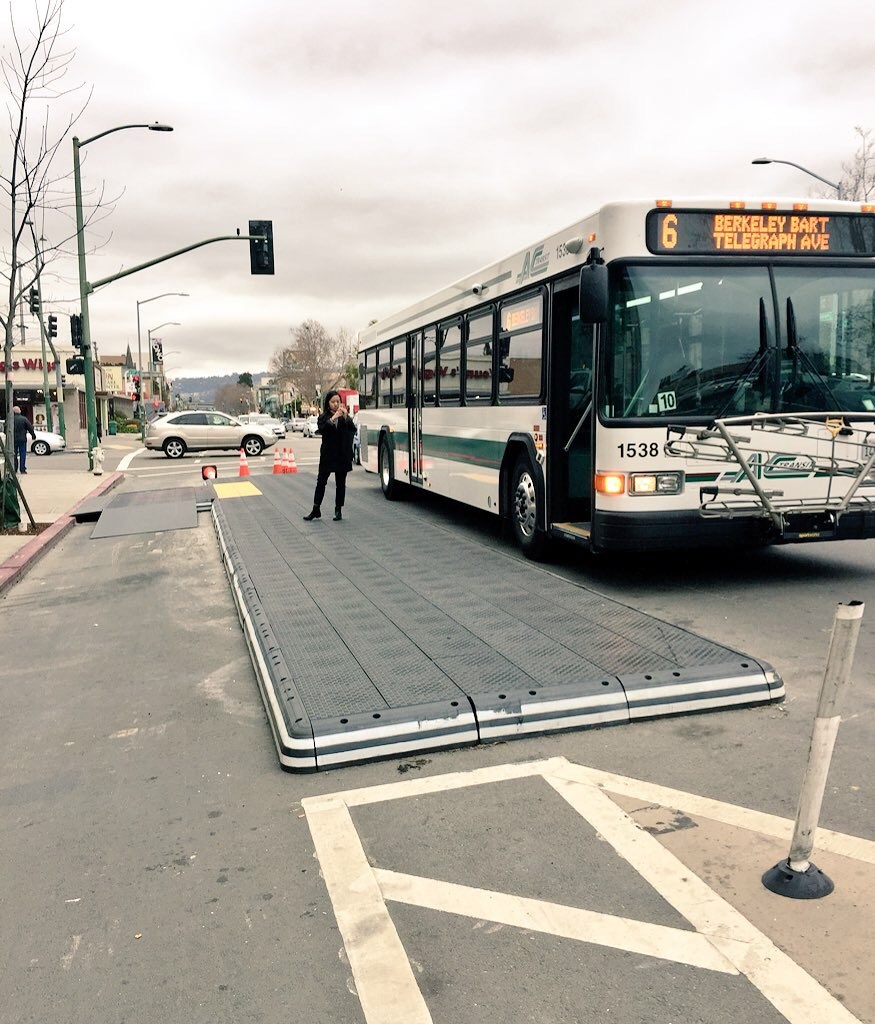Note: Metropolitan Shuttle, a leader in bus shuttle rentals, regularly sponsors coverage on Streetsblog San Francisco and Streetsblog Los Angeles. Unless noted in the story, Metropolitan Shuttle is not consulted for the content or editorial direction of the sponsored content.
A decision will be made tonight at the Oakland City Council whether or not to move forward on installing new pavement, protected bike lanes, and bus-boarding islands on the Temescal section of Telegraph Avenue.
UPDATE: From WOBO--vote was rescheduled to Friday 11 a.m.
"It is paramount that Telegraph Avenue be repaved in Spring 2019. The current state of the street is abhorrent, unsafe, and unacceptable. The Temescal community has been waiting for over a decade for this part of the street to be repaved," wrote Shifra de Benedictis-Kessner, director of the Temescal Business Improvement District (BID), in an email to Streetsblog.
But the decision may boil down to a simple question: are people worth more if they drive a private motor vehicle than if they take a bus or ride a bike?
At last week's meeting of Oakland's Public Work's Committee Meeting, Councilmember Rebecca Kaplan fought hard against the Temescal repaving and safety plan because it could delay motorists. "Traffic calming is for safety, not blocking the road completely with the bus," she exclaimed, objecting to the project's planned bus-boarding islands, which would make cars wait when a bus stops to pick up and discharge passengers. "A bus has deployable wheelchair ramps--we’re talking about many minutes of it in the roadway!"
Michael Eshleman, Service Planning Manager for AC Transit, along with Ryan Russo, Oakland's Director of Transportation, explained that the standard practice of having buses pull over to the curb and struggle back into traffic at each stop creates problems. For one, it's a hazard as buses and bicyclists jockey for position along the curb.
It also prioritizes single-occupancy cars over buses full of people, and makes the buses slow and unreliable.
“It’s fundamentally inequitable” said Jeff Tumlin, Principal and Director of Strategy at NelsonNygaard Consulting, about how we treat bus riders in general, during a panel discussion earlier this year at San Francisco’s Urban Land Institute. Tumlin also set up Oakland's Department of Transportation. “We even manage traffic signals based on vehicle progression” rather than on how many people move through an intersection, “so a person on a bus is valued at 1/200th of a person driving in a car."
Pushing back against that transportation inequity, and making the street safer, is part of why the City of Oakland built parking-protected bike lanes and bus-boarding island along the Kono section of Telegraph, from 21st to 27th.
And it worked.
Telegraph in Kono, where protected bike lanes were installed in 2016, now boasts a forty percent reduction in collisions and, despite the anecdotes, an uptick in overall receipts from local merchants. And the bus-boarding islands save riders five to twenty seconds per stop.
For sure, treatments in Kono aren't perfect. Intersections were poorly designed and still allow way too many conflicts between turning cars and bikes. But the improved plans for Temescal weren't created in a vacuum. Russo and his team are picking from an expanding tool box of safe-street treatments that are now tested from coast-to-coast.
So tonight's vote won't be about whether or not Oakland can make Telegraph safer in Temescal. It will be about whether some politicians will continue to be allowed to talk and tweet green, progressive values while voting the opposite way on our streets.
Bike East Bay and Walk Oakland, Bike Oakland ask you to show your support at City Council this evening, Tuesday December 11, starting at 5:30 p.m., at City Hall, 1 Frank Ogawa Plaza, Oakland 94612. [The Telegraph item, wrote WOBO, is likely going to be late in the agenda, at Agenda item S15. Bike East Bay and WOBO ask that you join them before the item comes up at Cafe Van Kleef.] Get a jump start and sign up to speak.





